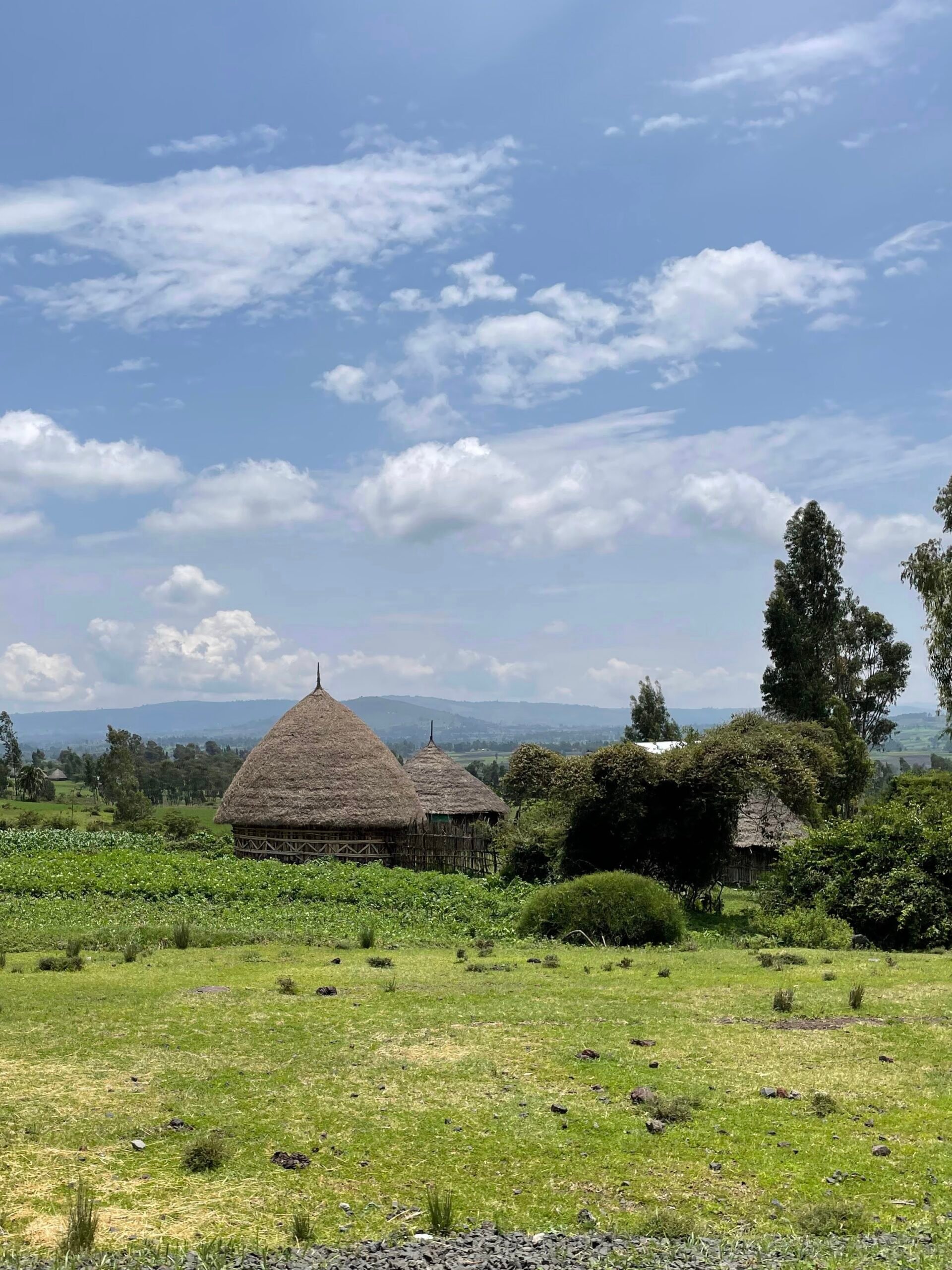
While in Ethiopia, my team and I had opportunities to preach sermons and share testimonies at local churches. On Sunday, August 3rd, I took the opportunity to give a sermon at a church we hadn’t been to before. If you know me, you know that public speaking is not my favorite thing in the world. But the opportunity was there, and I didn’t fly all the way to Africa to shy away at an uncomfortable and stretching opportunity. We didn’t know much of what to expect, only that this church had never invited an outsider to speak before. No pressure, right? I started praying into what the Lord wanted me to share a few days beforehand. I felt like He impressed upon my heart to speak on a question that I had come on the race with. Who is God? Who is He for who He actually is, not for who I want Him to be or who I think He is?
That week I had been going through the Gospel of John in my own quiet time with the Lord. God brought to my mind the 7 I AM statements that Jesus uses to describe Himself, God, in that book, and how they can start to answer this question that God has been answering for me throughout this mission trip.
We walked into the service, and the chairs weren’t very full at all. If I’m being totally honest, that was a relief. Less eyes on me. Our friends, Dereje and Sintu from HopEthiopia, sat with us in the front row as worship continued. It wasn’t until I walked up to the pulpit with Dereje, who translated my English into Oromo, that I saw that the sanctuary was a bit more full than when we showed up. There wasn’t an empty chair in sight. Easily 200 people were staring back at me. No pressure, right? All that said though, I prayed and knew that it would not be me speaking, but the Lord who would speak through me (Matthew 10:20-21). I am merely an empty vessel for Him to do His work through, praise God. There were lots of smiles, too, as we walked up front, which helped me to feel better, more welcome. I was also grateful to have Dereje up there with me, a familiar face and friend we’d gotten to know pretty well during our time in Ethiopia. This is a picture of both of us after church that day!

I knew that if I was one of them sitting in the congregation and this “ferengi” walked up front (that’s what they call us and all white people, even the children literally shout “Hi, ferengi!” to us in the streets), I’d want some context on what on earth she’s doing in my country because I’ve probably never seen a person that looks like her. Why should the congregation listen to me? I knew it’d be important to share part of my story to show them why this topic is so close to my heart. The part of my story that caused me to ask God who He really is, because I thought I knew and then my life was turned upside down. So, I opened with explaining that I signed up for the World Race to find out who God really is because my boyfriend passed away very suddenly two and a half years ago, and the God I thought I knew never would have let that happen. This question carries weight for me, just like it does for the people in that church, I’m sure.
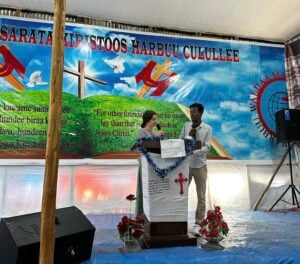
To start to give an answer to this, I walked through each of the I AM statements. The significance of the phrasing “I AM” in the Bible is heavier than just three letters. Those words are only ever used by God to describe Himself, and the people during Jesus’ time on Earth knew this. So when “Jesus said to them,” in John 8:58, “‘Most assuredly, I say to you, before Abraham was, I AM,’” that was absolutely insane for people to hear at that time. He was calling Himself God! The Jews He was speaking to started freaking out when they heard that! They even tried to stone Him to death! For Him to say “I AM” is either the worst blasphemy imaginable, or He is the Messiah they’ve been told about for their entire lives. The God of Abraham, Issac, and Jacob, the God of Moses, this God they’ve spent their entire lives studying, this God they’ve only ever known through ink on a page and stories from their parents, is now standing before them in the flesh. What are they supposed to do with that?? What are we supposed to do with that?? We’re supposed to know Him. Personally. Honestly. Intimately.
We’re supposed to listen when He tells us who He is. He says, “I AM the bread of life (John 6:35), the light of the world (8:12), the door of the sheep (10:7), the good shepherd (10:11), the resurrection and the life (11:25), the way, the truth, and the life (14:6), and the true vine” (15:1). I walked through each of these I AM statements in my sermon to begin to answer the question of who God is. Of course, God is infinitely too big for us to fully understand, but we can still use these descriptions as a jumping off point to know Him better, to trust Him better, to love Him better, and to be loved by Him better.
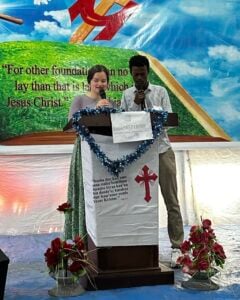
Through all these scriptures, Jesus tells us that He is good, that God is good. He is the only One that will ever satisfy us. He guides us out of darkness into His light. He is the only entrance into salvation and wants more than anything to be in relationship with us, with you. He sticks it out with us through the trials of this life and invites us to know His voice. He cannot bear the thought of heaven without us, so He died the death that we all deserve so that we don’t have to, if only we believe in Him and what He did for us, for you, on the cross. He is the only way to the Father, the only Truth, the only eternal life. He is the only One who can enable us to live and abide within God’s perfect will. He loves us. He loves you.
To conclude, I invited anyone who hadn’t already accepted Jesus as their own personal Lord and Savior to ask themselves if they are willing to follow this God, this one and only true God who gave His life for them, for you and for me, who thought of you while He hung on that cross, knowing that you are worth dying for. That is easily the most important question you will ever ask yourself because it is the only question that carries consequences into eternity.
I also asked them, that if they have already accepted Jesus, who is He to them? To you? Is He your good shepherd? Your bread of life? Your true vine? I encouraged them to get to know Jesus in each one of these ways, because if it was important enough to God to record it 2,000 years ago and to preserve for us to read today, then it’s more than important enough for us now to apply to our lives.
I wrapped up the sermon in 30 minutes exactly, including translation, which was only by the power of God, because my teammate, John, read over my notes beforehand and said, “Sarah, this is easily a 40 minute sermon, without Dereje’s translation.” No pressure, right? But praise God that Holy Spirit made my notes all make sense in my mind, and I just knew what to say and what to leave out without questioning myself. It really was Him speaking, and not me. Praise God!
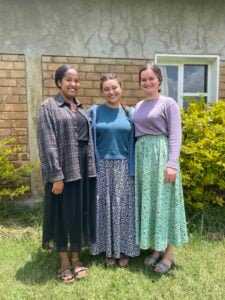
Galatoma! And God bless!
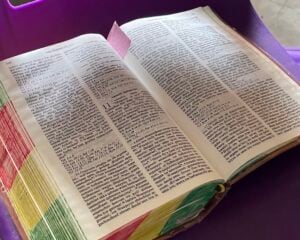








Sarah, this is absolutely beautiful. I am at a loss for words.
❤️Mom
Way to step up!
So awesome to hear about you continuously pushing yourself for God by sharing your testimony and sermons throughout this trip! Really powerfully topic to speak on! Encouraging to see how God is using you and working to further his plan through you!